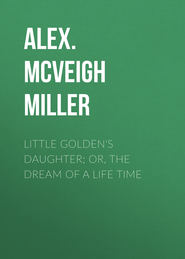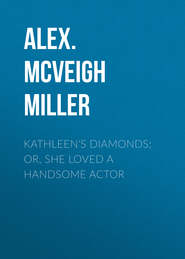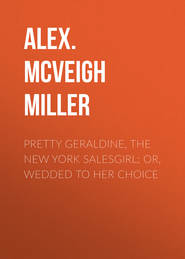По всем вопросам обращайтесь на: info@litportal.ru
(©) 2003-2024.
✖
Lancaster's Choice
Автор
Год написания книги
2018
Настройки чтения
Размер шрифта
Высота строк
Поля
"It will never do for her to stay in this mood. She shall go to England, nolens volens," he resolved.
"Richard" began to be "himself again." The ludicrous side of the case dawned upon him.
"I have made a tremendous faux pas, certainly, and now I must get out of it the best way I can," he thought, grimly.
Leonora's sharp little tongue had grown still now, and her face was again hidden in her hands. He went up to her and touched her black sleeve lightly.
"Oh, come now," he said; "if you go on like this I shall think I made a very apposite mistake. Who but a baby would make such a declaration as yours in the face of the circumstances? Of course you are going to Europe with me!"
"I am not," she cried, with a mutinous pout of the rich red lips.
"Yes, you are," he replied, coolly. "You have no business to get angry with me because I made a slight mistake about your age. And after all, I remember now that it was really De Vere's mistake, and not mine."
"Who is De Vere?" inquired Leonora, curiously, as she glanced up at him through her wet lashes, and showing the rims of her eyes very pink indeed from the resentful tears she had shed.
"De Vere is my friend and traveling-companion," he replied.
"And does he, too, consider me a bore and a nuisance?"
"Well," confidingly, "to tell you the truth, we both did—that is, you know, while we were laboring under the very natural mistake that you were a very small baby instead of—a grown-up one. But all that is altered now, of course, since I have met you, Miss West. We shall be only too happy to have you for our compagnon du voyage."
He was speaking to her quite as if she were his equal, and not the lowly born niece of the housekeeper at his ancestral home. It was impossible to keep that fact in his head. She was so fair, so refined, so well-bred, in spite of the little flashes of spirit indicative of a spoiled child.
She did not answer, and he continued, pleasantly:
"I am very sorry for the mistake on my part that caused you so much annoyance. I desire to offer you every possible apology for it."
She looked up at him quickly. "Oh, I wasn't mad because you thought Leonora West was a baby," she said.
"Then why—because I thought you were a nurse?"
"Not that either. I was only amused at those mistakes of yours."
She paused a moment, then added, with a rising flush:
"It was for those other words you said."
"I do not blame you at all. I was a regular brute," said Lancaster, penitently. "Do say that you forgive me, I never should have said it if only I had known."
"Known what?" she inquired.
"That you were the baby I had to carry to England. I should have been only too happy to be of service to you. De Vere will be distracted with envy at my privilege. There, I have said several pretty things to you. Will you not forgive me now?"
"Yes, I will forgive you, but you do not deserve it," answered Leonora. "It was not kind to talk about me so, even if I had been an unconscious baby."
"It was not," he admitted. "But think a moment, Miss West. I am a bachelor, and I know nothing at all of babies. I have forgotten all the experiences of my own babyhood. I was wretched at the idea of having to convey one of those troublesome little problems across the ocean. I would as soon have been presented with a white elephant. I should have known quite as much of one as the other. Can you find it in your heart to chide me for my reluctance?"
Leonora reflected, with her pretty brows drawn together.
"Well, perhaps you are right," she acknowledged, after a moment. "They are troublesome—babies, I mean—I think you called them problems. You were right there, too, for one does not know what to make of them, nor what they will do next, nor what they will become in the future."
"Then you can not blame me, can not be angry with me. And you will be ready to go with me to-morrow?"
"No, I think not. I am afraid, after all you have said, Captain Lancaster, that you really are vexed in your mind at the thought of taking me. I do not believe I ought to take advantage of your pretended readiness," she replied, sensitively, and with that perfect frankness that seemed to be one of her characteristics.
"And you refuse to go with me?" He gazed at her despairingly.
"I would rather not," decidedly.
He looked at the pretty face in some alarm. It had a very resolute air. Would she really carry out her threat of staying behind? He did not know much about American girls, but he had heard that they managed their own affairs rather more than their English sisters. This one looked exceedingly like the heroine of that familiar ballad:
"When she will, she will, depend on't,
And when she won't, she won't,
And there's an end on't."
She glanced up and saw him pulling at the ends of his mustache with an injured air, and a dark frown on his brow.
"Why do you look so mad? I should think you would be glad I'm not going."
"I am vexed. I wasn't aware that I looked mad. In England we put mad people into insane asylums," he replied, rather stiffly.
"Thank you. I understand. Old England is giving Young America a rhetorical hint. Why do you look so vexed, then, Captain Lancaster?"
"Because there will be no end of a row in Lancaster Park when I go there, because you have not come with me."
"Will there, really?"
"Yes; and my aunt, Lady Lancaster, who has promised to give me all her money when she dies, will cut me off with a shilling because I have disobeyed her orders and disappointed Mrs. West."
The blue-gray eyes opened to their widest extent.
"No!" she said.
"Yes, indeed," he replied.
"Then she must be a very hard woman," said Miss West, in a decided tone.
"She is," he replied, laconically.
"You are certain that she would not give you the money?" anxiously.
"Quite certain," he answered.
"And—have you none of your own?"
"Only my pay in the army," he admitted, laughing within himself at her naïve curiosity.
"Is that much?" she went on, gravely.
"Richard" began to be "himself again." The ludicrous side of the case dawned upon him.
"I have made a tremendous faux pas, certainly, and now I must get out of it the best way I can," he thought, grimly.
Leonora's sharp little tongue had grown still now, and her face was again hidden in her hands. He went up to her and touched her black sleeve lightly.
"Oh, come now," he said; "if you go on like this I shall think I made a very apposite mistake. Who but a baby would make such a declaration as yours in the face of the circumstances? Of course you are going to Europe with me!"
"I am not," she cried, with a mutinous pout of the rich red lips.
"Yes, you are," he replied, coolly. "You have no business to get angry with me because I made a slight mistake about your age. And after all, I remember now that it was really De Vere's mistake, and not mine."
"Who is De Vere?" inquired Leonora, curiously, as she glanced up at him through her wet lashes, and showing the rims of her eyes very pink indeed from the resentful tears she had shed.
"De Vere is my friend and traveling-companion," he replied.
"And does he, too, consider me a bore and a nuisance?"
"Well," confidingly, "to tell you the truth, we both did—that is, you know, while we were laboring under the very natural mistake that you were a very small baby instead of—a grown-up one. But all that is altered now, of course, since I have met you, Miss West. We shall be only too happy to have you for our compagnon du voyage."
He was speaking to her quite as if she were his equal, and not the lowly born niece of the housekeeper at his ancestral home. It was impossible to keep that fact in his head. She was so fair, so refined, so well-bred, in spite of the little flashes of spirit indicative of a spoiled child.
She did not answer, and he continued, pleasantly:
"I am very sorry for the mistake on my part that caused you so much annoyance. I desire to offer you every possible apology for it."
She looked up at him quickly. "Oh, I wasn't mad because you thought Leonora West was a baby," she said.
"Then why—because I thought you were a nurse?"
"Not that either. I was only amused at those mistakes of yours."
She paused a moment, then added, with a rising flush:
"It was for those other words you said."
"I do not blame you at all. I was a regular brute," said Lancaster, penitently. "Do say that you forgive me, I never should have said it if only I had known."
"Known what?" she inquired.
"That you were the baby I had to carry to England. I should have been only too happy to be of service to you. De Vere will be distracted with envy at my privilege. There, I have said several pretty things to you. Will you not forgive me now?"
"Yes, I will forgive you, but you do not deserve it," answered Leonora. "It was not kind to talk about me so, even if I had been an unconscious baby."
"It was not," he admitted. "But think a moment, Miss West. I am a bachelor, and I know nothing at all of babies. I have forgotten all the experiences of my own babyhood. I was wretched at the idea of having to convey one of those troublesome little problems across the ocean. I would as soon have been presented with a white elephant. I should have known quite as much of one as the other. Can you find it in your heart to chide me for my reluctance?"
Leonora reflected, with her pretty brows drawn together.
"Well, perhaps you are right," she acknowledged, after a moment. "They are troublesome—babies, I mean—I think you called them problems. You were right there, too, for one does not know what to make of them, nor what they will do next, nor what they will become in the future."
"Then you can not blame me, can not be angry with me. And you will be ready to go with me to-morrow?"
"No, I think not. I am afraid, after all you have said, Captain Lancaster, that you really are vexed in your mind at the thought of taking me. I do not believe I ought to take advantage of your pretended readiness," she replied, sensitively, and with that perfect frankness that seemed to be one of her characteristics.
"And you refuse to go with me?" He gazed at her despairingly.
"I would rather not," decidedly.
He looked at the pretty face in some alarm. It had a very resolute air. Would she really carry out her threat of staying behind? He did not know much about American girls, but he had heard that they managed their own affairs rather more than their English sisters. This one looked exceedingly like the heroine of that familiar ballad:
"When she will, she will, depend on't,
And when she won't, she won't,
And there's an end on't."
She glanced up and saw him pulling at the ends of his mustache with an injured air, and a dark frown on his brow.
"Why do you look so mad? I should think you would be glad I'm not going."
"I am vexed. I wasn't aware that I looked mad. In England we put mad people into insane asylums," he replied, rather stiffly.
"Thank you. I understand. Old England is giving Young America a rhetorical hint. Why do you look so vexed, then, Captain Lancaster?"
"Because there will be no end of a row in Lancaster Park when I go there, because you have not come with me."
"Will there, really?"
"Yes; and my aunt, Lady Lancaster, who has promised to give me all her money when she dies, will cut me off with a shilling because I have disobeyed her orders and disappointed Mrs. West."
The blue-gray eyes opened to their widest extent.
"No!" she said.
"Yes, indeed," he replied.
"Then she must be a very hard woman," said Miss West, in a decided tone.
"She is," he replied, laconically.
"You are certain that she would not give you the money?" anxiously.
"Quite certain," he answered.
"And—have you none of your own?"
"Only my pay in the army," he admitted, laughing within himself at her naïve curiosity.
"Is that much?" she went on, gravely.











